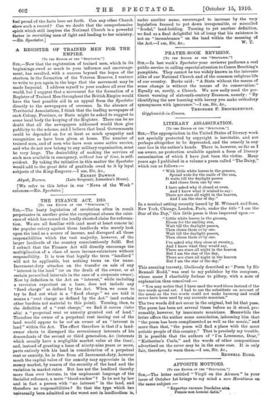THE FINANCE ACT, 1910.
[To THE EDITOR OF THZ "SPECTAT0R:]
SIR,—The hasty legislation of revolution often in result perpetuates in another guise the exceptional abuses the exist- ence of which has caused the loudly shouted claim for reforma- tion. We are all familiar with (and most at heart concur in) the popular outcry against those landlords who merely look upon the land as a source of income, and disregard all those responsibilities which the vast majority, however, of the larger landlords of the country conscientiously fulfil. But I submit that the Finance Act will directly encourage the multiplication of a class of mere income-extractors without responsibility. It is true that legally the term " landlord " will not be applicable, but nothing turns on the name. Increment-duty attaches on the transfer on sale of any "interest in the land" (or on the death of the owner, or at certain prescribed intervals in the case of a corporate owner). Now by definition in the Act an "interest," while including a reversion expectant on a lease, does not include any "fixed charge" as defined by the Act. When we come to try to find out what is a "fixed charge" we are told it means a "rent charge as defined by the Act" (and certain Other burdens not material to this point). Turning, then, to the definition of . a "rent charge," we find it covers (inter alia) a "perpetual rent or annuity granted out of land." Therefore the owner of a perpetual rent issuing out of the land would appear to be not an owner of an "interest in land" within the Act. The effect therefore is that if a land- owner elects to disregard the reversionary interests of his descendants of the second or third generation, &a. (interests which usually have a negligible market value at the time!, and, instead of granting a lease of ninety-nine years or more, parts entirely with his land in consideration of a perpetual rent or annuity, he is free from all Increment-duty, however much the capital value of the annuity may appreciate in the money market, by reason of the security of the land and the variation in market rates. But has not the landlord thereby more than ever become, in the unpleasant language of the Socialist reformer, a mere "blood-sucker"? Is he not by law and in fact a person with "no interest" in the land, and therefore no responsibilities ? So that the type which has
universally been admitted as the worst sort in landlordism is, , under another name, encouraged to increase by the very legislation framed to put down irresponsible, or miscalled "feudal," land-holding. Turning to yet another definition, we find as a final delightful bit of irony that his existence is not an " incumbrance " on the land within the meaning of














































 Previous page
Previous page